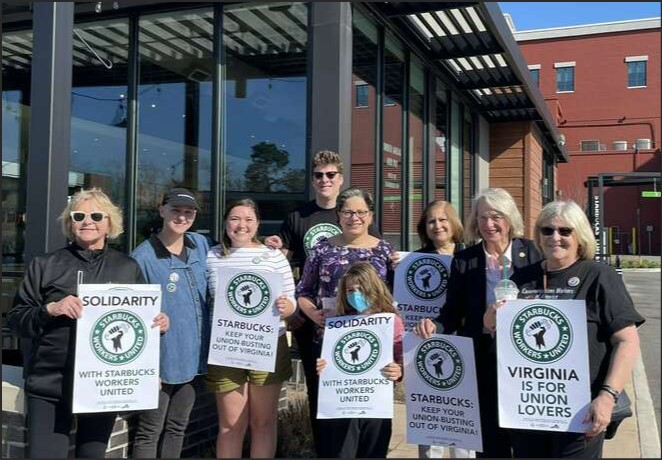
by James A. Bacon
Employees at five Starbucks coffee stores in the Richmond area have voted for union representation — and I’m just fine with that. I oppose public-sector unions for reasons frequently enumerated on this blog. But if private-sector employees want to band together to increase their bargaining power with management, that’s their right in a free society. I wish them all the luck in the world. With paychecks shredded by an 8.5% surge in the cost of living in the past year, they need all the help they can get.
Employees voted for the union by a wide margin, reports The Richmond Times-Dispatch. The vote followed a union loss in a representation election in Springfield last week, according to Tag24, These votes were part of a larger organizing campaign conducted by the Northern Virginia Labor Federation and Workers United. Twenty Starbucks stores have now unionized nationally, and 220 others have sought elections.
WUSF Public Media delves into the issues at Virginia Starbucks stores.
Starbucks prides itself as a standout employer, promising that all employees will earn at least $15 an hour (plus shared tips) by this summer and providing benefits such as financial support for distance learning and limited free food and drink from the outlets. Employees, mostly in their 20s and 30s, also like the socially progressive corporate culture.
The COVID pandemic represented a turning point in employee-management relations. Starbucks paid workers whether or not they went to work, gave 14 days of paid time off to workers exposed to COVID, expanded child care benefits and, for a time, paid an extra $3 per hour in hazard pay. But working conditions deteriorated as employees fretted about customers without masks, coworkers called in sick with no one to replace them, and then, as the COVID panic subsided, Starbucks began rolling back some benefits. An additional consideration, says WUSF, is that workers want a bigger say in how their stores are run.
CEO Howard Schultz, a former CEO who relinquished his post in 2017 and was recently reinstalled in the top spot, has appealed to employees to trust him to make things right. “My job in coming back to Starbucks is to ensure the fact that we… reimagine a new Starbucks with our partners at the center of it all, as a pro-partner company, as a company that does not need someone in between us and our people.” (Employees are referred to as partners.)
Labor unions force corporations to up their game. My views on the subject are colored by the views of coal entrepreneur E. Morgan Massey, whose biography I published shortly before he died a year ago. Often colored as a “union buster,” Massey profitably operated both union and non-union coal operations — although the non-union mines out-performed union mines in profitability by wide margins. Viewing his labor-relations policies as one of the company’s competitive advantages in a hyper-competitive industry, Massey used the United Mine Workers of America contract as a benchmark for compensation and working conditions. He wanted his non-union employees to make more money through base pay and productivity bonuses than they would under a union contract. By avoiding union work rules, he could organize his workforce in highly productive work teams, more than offsetting higher compensation costs with greater coal production. He also implemented hire-from-within policies to give his best employees avenues of upward mobility, and he often subsidized their educations at Virginia Tech and West Virginia University engineering schools. Massey fought the union tooth-and-nail, but he often remarked that the coal industry “got the union it deserved.”
Labor strategies that might work in an industrial setting like a coal mine might not transfer well to customer-facing businesses like coffee shops. It’s not as if creating incentives to pour more cups of coffee per hour is likely to boost Starbucks’ productivity and profitability (although I’m sure that Starbucks would love to figure out how to serve the same number of customers with fewer employees).
If union work rules interfere with providing good customer service, I will be none too happy as a consumer. On the other hand, I sympathize with the desire of Starbucks employees to earn a living wage. If the union — or fear of the union — makes Starbucks a better employer, then good for the Northern Virginia Labor Federation.

Leave a Reply
You must be logged in to post a comment.